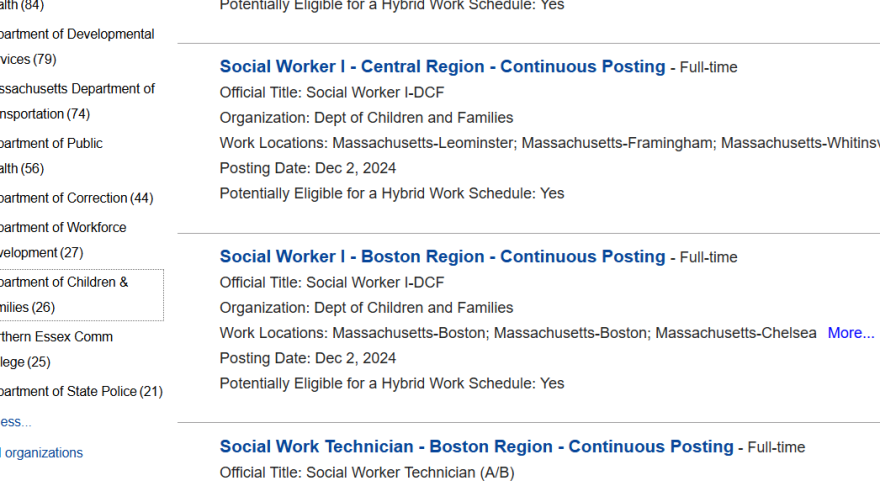Social workers with Massachusetts' child welfare agency have been leaving the system in droves.
According to The Boston Globe, turnover among caseworkers at the Department of Children and Families, long a troubling norm, has spiked since the COVID pandemic. And that's caused instability for children while threatening to undermine the agency's mission.
Jason Laughlin co-wrote the Globe article with Scooty Nickerson.
Kari Njiiri, NEPM: So how bad is the exodus from DCF and what are the reasons for it?
Jason Laughlin, The Boston Globe: It's pretty sizable. We found that in 2021, about 500 social workers left the agency. And this had come after years of DCF apparently making a very concerted effort to beef up its social worker ranks. They have been hiring since then, but they have not come back to the levels they were in in 2021.
The reasons for it are, in part, something that was seen in social service agencies nationwide during the pandemic, which is that people just found that they could do easier jobs for more money doing something else. It's a national problem. It's been showing up in all kinds of social service work.
Some specific circumstances in Massachusetts that played a role is, around that time, school districts were doing a lot of hiring, including for school counselor jobs, things like that. And that turned out to be a very attractive option for some of the people that had been working for DCF.
It was about the pay?
It's about the pay, and it's about the work. Working for the Department of Children and Families is really difficult. The workers I talked to described very long hours — a lot of driving back and forth across the state as they're moving kids between their families and placements and school, [and] time spent on paperwork.
It's a grueling, difficult job. And obviously you're dealing with families that are having a real difficult time, and that adds to the emotional challenge of the work.
Yeah, this has taken a toll on families. I know you write of one mother whose attempts to see her three young children were hampered by the series of revolving caseworkers.
Yes, she was entitled to a weekly visit with her kids, and for two weeks straight, she just couldn't get a hold of her social worker. And when she finally went to a DCF office in-person, she was told, "Oh, your children have a new caseworker." And I guess she was never told about that and wasn't informed about it. And so she was essentially texting somebody to schedule a visit who was no longer involved with her children's case.
It's not just devastating for parents, but for children. That kind of instability can really take a toll. You're dealing with kids that have a hard time forming trusting relationships to begin with. And if a parent just disappears for weeks on end, that can be really traumatic for them.
Is this caseworker turnover specific to Massachusetts or is it part of a nationwide trend?
It's happening nationally. And actually it looks like it may not be as bad in Massachusetts as it is in some other places. The turnover rate in Massachusetts, when I talked to a national expert, they said, "Well, that's actually not terrible compared to what some other states are doing." So just because it's better doesn't mean it's not a problem.
A couple of the other people I talked to for this story were foster families, and they said that they have kids in their care that need a lot of care, a lot of attention, that need support. And making those kids move forward, helping them with the support they need, just isn't happening because of the caseworkers are so inconsistent. They just are sort of a revolving door of people coming in and out of these children's lives.
What is the Department of Children and Families specifically, and the Healey administration in general, doing to address this exodus of caseworkers?
They have been hiring. If you look at this year and last year, the staff numbers are more or less even. So, there's not a net loss of workers like they had been seeing. They are not, though, up to where they were a few years ago, as far as their social work staff numbers.
They are offering training. They're offering wellness support for workers. But ultimately, the workers I talked to say the job is still just very difficult and very grueling. And for some of them, it's better to look for other options.







